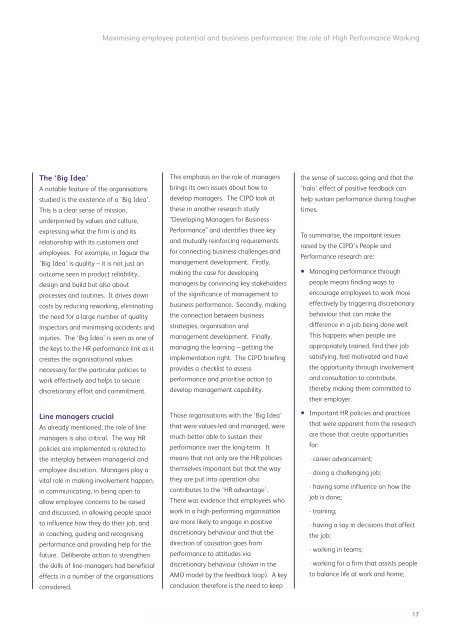About EEF - CIPD
About EEF - CIPD
About EEF - CIPD
You also want an ePaper? Increase the reach of your titles
YUMPU automatically turns print PDFs into web optimized ePapers that Google loves.
Maximising employee potential and business performance: the role of High Performance WorkingThe ‘Big Idea’A notable feature of the organisationsstudied is the existence of a ‘Big Idea’.This is a clear sense of mission,underpinned by values and culture,expressing what the firm is and itsrelationship with its customers andemployees. For example, in Jaguar the‘Big Idea’ is quality – it is not just anoutcome seen in product reliability,design and build but also aboutprocesses and routines. It drives downcosts by reducing reworking, eliminatingthe need for a large number of qualityinspectors and minimising accidents andinjuries. The ‘Big Idea’ is seen as one ofthe keys to the HR-performance link as itcreates the organisational valuesnecessary for the particular policies towork effectively and helps to securediscretionary effort and commitment.Line managers crucialAs already mentioned, the role of linemanagers is also critical. The way HRpolicies are implemented is related tothe interplay between managerial andemployee discretion. Managers play avital role in making involvement happen,in communicating, in being open toallow employee concerns to be raisedand discussed, in allowing people spaceto influence how they do their job, andin coaching, guiding and recognisingperformance and providing help for thefuture. Deliberate action to strengthenthe skills of line-managers had beneficialeffects in a number of the organisationsconsidered.This emphasis on the role of managersbrings its own issues about how todevelop managers. The <strong>CIPD</strong> look atthese in another research study“Developing Managers for BusinessPerformance” and identifies three keyand mutually reinforcing requirementsfor connecting business challenges andmanagement development. Firstly,making the case for developingmanagers by convincing key stakeholdersof the significance of management tobusiness performance. Secondly, makingthe connection between businessstrategies, organisation andmanagement development. Finally,managing the learning – getting theimplementation right. The <strong>CIPD</strong> briefingprovides a checklist to assessperformance and prioritise action todevelop management capability.Those organisations with the ‘Big Idea’that were values-led and managed, weremuch better able to sustain theirperformance over the long-term. Itmeans that not only are the HR policiesthemselves important but that the waythey are put into operation alsocontributes to the ‘HR advantage’.There was evidence that employees whowork in a high-performing organisationare more likely to engage in positivediscretionary behaviour and that thedirection of causation goes fromperformance to attitudes viadiscretionary behaviour (shown in theAMO model by the feedback loop). A keyconclusion therefore is the need to keepthe sense of success going and that the‘halo’ effect of positive feedback canhelp sustain performance during toughertimes.To summarise, the important issuesraised by the <strong>CIPD</strong>’s People andPerformance research are:• Managing performance throughpeople means finding ways toencourage employees to work moreeffectively by triggering discretionarybehaviour that can make thedifference in a job being done well.This happens when people areappropriately trained, find their jobsatisfying, feel motivated and havethe opportunity through involvementand consultation to contribute,thereby making them committed totheir employer.• Important HR policies and practicesthat were apparent from the researchare those that create opportunitiesfor:- career advancement;- doing a challenging job;- having some influence on how thejob is done;- training;- having a say in decisions that affectthe job;- working in teams;- working for a firm that assists peopleto balance life at work and home;17
















